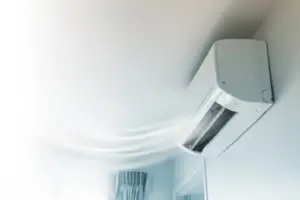Why should I service my air conditioner?
As an expensive item, we want to keep our split systems running as smoothly and efficiently as possible. Like your car they need regular check-ups to make sure everything is working OK. A healthy air conditioner also helps ensure you aren’t spending more than you need on electricity bills.
Due to the presence of electricity and chemicals, a professional should always be the one you call to give your air conditioner a service.
But how often should you book a service to keep your machine running at optimum efficiency?
How often should I service my air conditioner?
Thankfully, services aren’t required that often. Experts generally agree that if your unit is functioning properly then once a year is best for a service.

But what if my machine’s not working well and it’s not time yet?
If your air conditioner shows signs of irregularity, then that’s probably a good time to call a technician. You don’t want it packing up unexpectedly during a mid-summer heat wave and dealing with the cost of an emergency visit.
What is generally involved in a service?
A general service for a split system air conditioner will generally involve:
- deodorising and sanitation of indoor coil and drain pan
- cleaning filters, condenser and inside of system
- checking operation in heating and cooling
- checking refrigerant charge, all electrical terminals and airflow.
A general service for a evaporative cooling system will generally involve:
- cleaning pads, filters and inside the system
- disinfecting the unit
- draining waste water and replace with fresh water
- checking pump operation, fan operation, ductwork, air flow and electrical components are working as they should
A service for a ducted system will generally involve:
- testing gas pressure and check for leaks and cracked heat exchangers inside the system
- carbon monoxide testing
- cleaning filters, condenser, inside of system and fan motor
- checking ducts, air flow and electrical components are working as they should
- checking operation of heating and cooling
A service of a hydronic heating system will generally involve:
- checking the expansion tank pressures, combustion, water in the panels/slab
- checking for air in system as air promotes rust forming and disrupts heating efficiency
- checking water quality
- checking that the systems gets up to the correct temperature
- a power flush descales the pipes and removes gunk from the all panels
- draining, cleaning and chemical dosing the system
- cleaning out boiler burner and flue components
- filling system, balance and bleed air from system
- checking and cleaning inside all panels check for water leaks and water pressure.

When should I book my service in?
To avoid the rush during summer, a split system unit should be looked at during the time of year when you least use it. Any time with milder weather; early spring or autumn is ideal. If you are worried about how busy the technicians might be during summer, then book yourself in during winter.
Tip: If you choose the same time every year it will be easier to remember.

Is there anything more I can do to improve the effectiveness of my machine?
As well as ensuring a yearly check there’s some pretty simple ways you can maintain optimum performance from a fully functioning machine.
Make use of the manufacturer’s instructions; have a look over the booklet that came with your split system. It will show you what parts of your air con are removable.
This is important as you can then;
- Wash any removable air conditioning filters. Fill up the bath with a mild detergent and warm water or got at it with a hose (be careful though). Make sure the filters are dry before you replace them. Cleaning / replacing filters can improve the efficiency of a split system by up to 15 percent, which can make all the difference (so it’s good to get the job done right).
- If you find the filters are beyond cleaning or if your unit sounds like it’s struggling before you conduct your clean; call the repairers.
- Use the timer. If you know an extremely hot/cold day is coming, set the system to start whilst you’re at work so it’s not struggling to be effective when the temperature is at its worst.
- Set the energy saver on timer when you are home. This will avoid it continuing to run if you nod off on the couch.
You can also:
- Resist the temptation to have the unit set at a very low temperature. This will make the system struggle a bit more to work, wearing out the motor and seals.
- Most brands suggest setting the unit at around 23 degrees, which will save you on consumption whilst making sure you’re still comfortable. At night, you can continue to save energy, either by turning the unit off all together or setting it at a higher temperature to match the overnight drop in temperature.
- Check the outside part of your split system. Dirt, leaves, weeds and other debris can get caught in it and obstruct the flow. Clear all around it and make sure nothing is in the way.
- Remove dust. You can go over the outside of the unit and its grills with a damp cloth or vacuum cleaner.
- Put your remote somewhere safe, away from little hands and replace the batteries as needed.
- Consider the location of your furniture; try and ensure the path in front of the unit is clear so the air can get to you.
- Keep your windows, curtains and blinds closed during the day. This will keep some of the heat out so that you won’t need to pump your system up to full power. Properly sun backed curtains are also a great investment and can maintain the inside temperature too.
Doing your best to optimise the flow and conditions under which your split system runs will save you on energy bills and repairs. As will a yearly service and some home maintenance, ensuring the unit is ready to perform at peak when you most rely on it to counteract the heat or cold.
